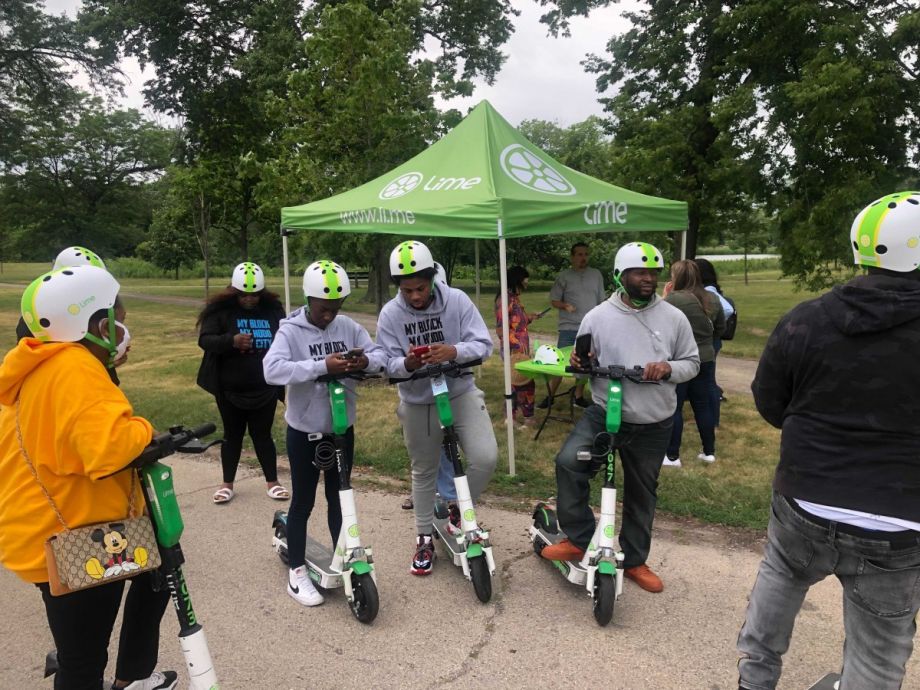After two pilot programs and a series of public testimonies, e-scooters are returning to Chicago permanently. The City Council Transportation Committee passed the ordinance on October 13 that would allow three companies to deploy about 12,500 scooters citywide starting next year, making e-scooters an integral part of the city’s transportation system. (Bird, Lime and Spin, as participants in the last city pilot, are likely the three companies, but they will have to re-apply.)
The e-scooter program showed some early success during both pilots. In the 2020 pilot, running at a much bigger scale than in 2019, an average of more than 4,000 trips were taken daily. More than 80% of the riders surveyed believed that scooters should be part of the city’s transportation future. E-scooter-related calls to 311, including complaints about sidewalk riding or devices being locked to private property, dropped by 75% compared to the 2019 pilot. Most injuries reported were minor and usually to scooter users themselves rather than to pedestrians.
Olatunji Oboi Reed, president and CEO of mobility justice advocacy group Equiticity, is excited to see the new transit alternative coming to his neighborhood. Born and raised on the south side of Chicago, Reed has seen firsthand how transportation inequities adversely impact majority Black and brown communities. Those communities have the fewest transportation choices, the longest commutes, the highest concentration of industrial centers and truck traffic.
“We don’t have the luxury of picking and choosing which mode of travel we want available in our neighborhoods,” says Reed. “The severity of the inequities is too vast [so] we must have every single mode of travel delivered to our doorstep.”
One highlight of the pilot is its effort to improve equity in ridership. Based on economic hardship and demographic data collected by the Chicago Department of Health, the city introduced the “Equity Priority Area” on the West and South sides in both pilots, covering approximately 45% of the pilot area. The three companies — Bird, Lime and Spin — were required to deploy 50% of their fleets to these historically underserved neighborhoods to increase accessibility.
Although the newly passed city ordinance does not include the Equity Priority Area, Ellen Gottschling, senior manager for streets and equity at Spin, says companies expect to see the final regulations have the same distribution requirements. Of the three companies who participated in the 2020 pilot, Spin was the most consistent with meeting the distribution requirements in the Equity Priority Area, according to the city’s final evaluation. Gottschling says that once the ordinance takes effect next year, Spin will continue to monitor and readjust scooter distribution to comply with whatever mandates exist.
“We have a way to look at a dashboard every day and see if the numbers [of scooters in each neighborhood] are correct,” said Gottschling. “ It wasn’t just [that the scooters] have to be there at 9 a.m. It’s like they have to be there at 9 am and 3 pm because we want to make sure to rebalance them throughout the day.”
Because the geographical distribution mandate is not included in the newly passed city ordinance, Reed and other activists are now trying to make sure an equitable distribution requirement is added during the rules and regulation process. However, Kate Lowe, an urban planning and policy professor at the University of Illinois Chicago, points out that rules and regulations could change from administration to administration.
“We have a commissioner right now at the Chicago Department of Transportation that gives a lot of attention to equity,” says Lowe. “But she won’t be in that role forever. So how do we make sure those equity provisions are permanent?”
It’s worth noting that even with the geographical mandate and all three companies mostly in compliance during the four-month pilot in 2020, rider demographics remained mostly white males with middle- to upper-class income levels. Only about one in five trips originated from the priority areas.
Reed suggests that simply putting scooters in these areas is not enough to encourage ridership. Lowe adds that because of inequitable infrastructure within the city, Black and brown neighborhoods have far fewer bike lanes, more crowded streets and more policing. The concerns for road safety have scared residents away from riding the scooters.
All three companies have produced safety instruction videos and offered free helmets to riders during the pilot. About 1,000 free helmets were given out. Bird and Lime also implemented incentive programs such as the “helmet selfie” to encourage helmet wearing. Riders can take a selfie of themselves wearing helmets in the e-scooter app to earn ride credits. However, the companies can only do so much, they say.
“The city must increase investments in infrastructure for better roads so there are fewer potholes for protected bike lanes across the city. Because that is the only way to increase safety … for cyclists, for scooter riders and for pedestrians,” said LeAaron Foley, director of government and community relations at Lime.
Another barrier that has caused low ridership in Black and brown neighborhoods is pricing. Data compiled during the 2020 pilot shows that the average trip is 18.5 minutes and costs $8. During the pilot phase, companies did develop programs to address pricing concerns. Bird and Lime offered 50% off rides in the equity priority area, and Bird also offered free rides for healthcare workers and teachers. Spin provided discount codes or free rides to users who received any government assistance. All three companies say they wish to continue their low-income programs once the new legislation goes into effect. But to Reed, that’s not enough.
“For poor people, it should be free,” says Reed. “Our mobility is so constricted in our neighborhoods. We are challenged to explore the beauty that exists in our city. Are we really trying to make a profit on a form of mobility?”
Despite the barriers, Reed believes that companies can engage the community more effectively. He suggests several ways to approach community outreach: meetings where companies could attend and hear questions and concerns directly from residents; group “scooter rolls,” similar to community bike rides during which residents could ride the scooters for free together around the neighborhood; or events attached to block parties, where scooter companies enroll residents in a discount program or teach safety classes. Spin has been doing this, in fact: the company has been organizing community panels within the Equity Priority Area and working with activists to gather feedback from community members. They hosted 18 in-person and digital outreach and education events during the four-month pilot.
Lowe cautions about pinning all hopes for increased mobility equity on the scooter companies’ voluntary initiatives.
“We can’t depend on for-profit firms to be prioritizing equity when its intention is with the revenue-generating strategies. When they do equity provisions, equity actions, I’m happy to applaud them. [But] we just can’t depend on goodwill charity.”
Reed remains optimistic about the future of e-scooters in his community.
“We’re on the brink of a transportation revolution in our society. And revolutions are never comfortable,” says Reed.

Hayley Zhao is the INN/Columbia Journalism School Intern with Next City for fall 2021. Zhao graduated from Columbia Journalism School in May 2021 with a focus on education and environmental reporting.
.(JavaScript must be enabled to view this email address)















